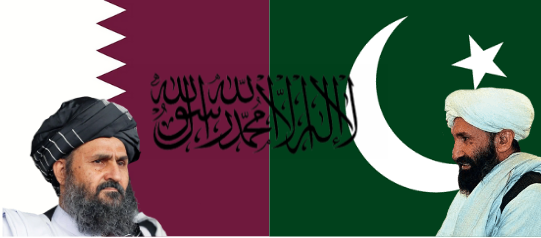No matter how big an organisation is, the internal rift turns out to be more devastating than any external threat. As the Taliban starts to thrust itself on Kabul, it is witnessing internal conflict by Qatar and Pakistan-backed segments. The Pakistan-backed group is led by Hasan Akhund, the Prime Minister from the Haqqani network, while Qatar backed group is led by Mullah Abdul Ghani Baradar, the deputy Prime Minister.
Baradar humiliated
According to a Bloomberg report, Mullah Abdul Ghani Baradar was physically assaulted by Khalil-ul-Rahman Haqqani at the Presidential Palace in Kabul. Khalil Ahmad Haqqani is the current Afghan Minister and a prominent leader of the Haqqani network. The assault took place during the talks over the formation of a cabinet.
It is being reported, that Baradar pushed for a western-style inclusive cabinet that would include non-Taliban leaders and ethnic minorities, which would be more acceptable to the world and would help get the Taliban government a faster recognition. At one point, Khalil left his seat and started punching Baradar with his bare hands.
Soon, their bodyguards got involved and started firing at each other. The incident is said to have resulted in an uncertain number of killings and injuries. Baradar is reported to have left for Kandhar to talk with Supreme Leader Haibatullah Akhundzada, the Taliban’s spiritual head.
On September 7, the Taliban announced an interim government with Akhund as Prime minister and Baradar as deputy prime minister. The government is formed with 90 per cent representation from ethnic Pashtuns from inside of Taliban. The members of the Pakistan-backed Haqqani network received four positions in the government. The FBI wanted terrorist Sirajuddin Haqqani has been handed over the post of interior minister in the government.
Haqqani network along with Mulla Yaqoob, son of the Taliban founder Mullah Mohammad Omar has been the galvanising force of the Taliban’s military wing. It was Pakistan that ensured that the Taliban is supplied with arms and ammunition over for over 20 years. Haqqani network merger with the Taliban in 2016 was the key factor in the expansion of the Taliban’s militaristic capacity.
Fighting with Mullah Omar during the 1980s, Baradar was one of the key founders of the Taliban. After the US invasion of Afghanistan in 2001, he was sheltered by Pakistan for a decade. However, Pakistan arrested him in 2010 and kept him under torture for 8 years. Baradar came to the limelight when he was invited by then US President Donald Trump for talks in Doha, Qatar. By hosting Baradar, Qatar has emerged as a key interlocutor in the relationship between the Taliban and the west.
Legitimacy vs Loyalty
Taliban has two basic needs. On, one hand, it needs recognition from the west, for which Baradar and Qatar will be key. Taliban also wants to run the country’s economy, for which it will need money, aid, and investment. The Gulf country has very deep pockets, and it can make sure that the Taliban government does not have to suffer any financial constraint and legitimacy issues from the international community.
On the other hand, the Taliban cannot let go of Pakistan. For the last 20 years, Pakistan has been keeping the Taliban alive so that it could support its Kashmir cause. Pakistan and Afghanistan share a 1,650 km border. Any discontent with the Taliban may result in Pakistan and China led dethroning of the Taliban government.
Read more: Mullah Baradar hates Pakistan and with Qatar’s support, he will abandon it
Taliban is walking on a tight rope and, both Qatar and Pakistan are not ready to leave their hold on the terrorist organisation. Any discontent between the government in Kabul and Shura in Kandhar has the potential to destabilise the already illegitimate Taliban government.
